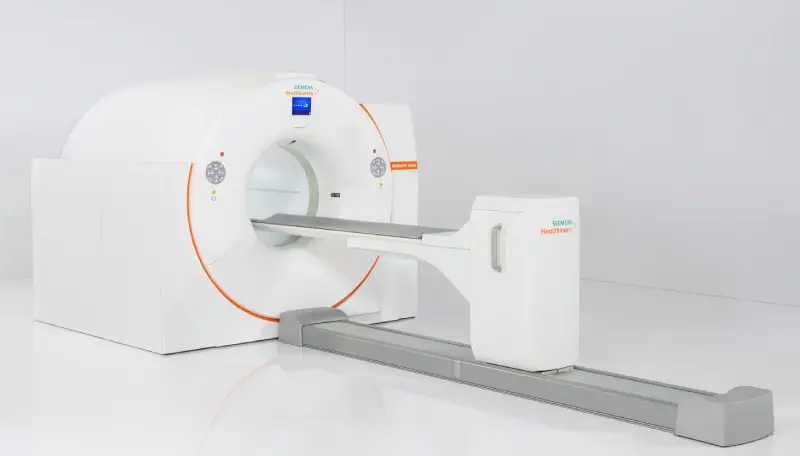Addenbrooke’s Hospital will become one of only a few hospitals in the UK to have a total-body PET scanner, as part of a £5.5m national investment to enhance care and enable cutting-edge research and drug development announced today.
Expected to be installed in Autumn 2026, the scanner will be able to scan a patient’s full-body in unprecedented detail improving the diagnosis and treatment of complex illnesses.

Positron emission tomography (PET) scans are used to create in-depth images of the body and are used to inform diagnosis and treatment of many diseases, including cancer, cardiovascular diseases, and neurodegenerative diseases such as dementia. Their sensitivity can help to detect early stages of disease so they can be treated before they have a chance to progress.
The new scanner is part of the ANGLIA network that brings together the NHS, universities and industry. It increases our ability to provide PET scans for NHS patients, and is particularly intended to benefit underserved communities across the East of England.
I am pleased that our patients will be some of the first to benefit from this groundbreaking technology. Harnessing the latest technologies and enabling more people to benefit from the latest research is a vital part of our work at CUH and is crucial to the future of the NHS.
By locating this scanner at Addenbrooke’s we are ensuring that it can be uniquely used to deliver wide ranging scientific advances across academia and industry, as well as improving the lives of patients.
Roland Sinker, Chief Executive of Cambridge University Hospitals NHS Foundation Trust, which runs Addenbrooke’s
Most PET scanners can only look at parts of the body, they are less sensitive and slower to collect images. The new scanner will be able to see the whole body in a level of detail that has never been seen before.
Total-body PET scans are also safe for use with a wider range of patients meaning that more people, including children, will be able to benefit and to take part in studies. This will mean greater access to research and new treatments for everyone and supports the UK’s ambition for everyone to be able to benefit from clinical research.

This is an exciting new technology that will transform our ability to answer important questions about how diseases arise and to search for and develop new treatments that will ultimately benefit not just our patients, but those across the UK and beyond.
It will also help us diagnose and treat diseases at an even earlier stage, particularly in children, for whom repeated investigations using standard PET scanners was not an option.
Professor Franklin Aigbirhio
The ability to scan the whole body in one go means the new scanner will be particularly useful for diseases that affect multiple parts of the body, allowing for better detection, diagnosis and treatment.
Locating the scanner at Addenbrooke’s offers benefits for local staff and scientists too, providing unique training, development and research opportunities. Through a dedicated University of Cambridge fellowship, the ANGLIA network aims to support more people from Black and other minority ethnic backgrounds to participate in PET chemistry and imaging.
Professor Aigbirhio, who is also co-chair of the UKRI MRC’s Black in Biomedical Research Advisory Group, added:
Traditionally, scientists from Black and other minority ethnic backgrounds are under-represented in the field of medical imaging. We aim to use our network to change this, providing fellowship opportunities and training targeted at members of these communities.
The new scanner is funded by the UKRI Medical Research Council (MRC) and forms part of the National PET Imaging Platform (NPIP), a first-of-its-kind national research collaboration in the UK.
The use of the scanner for research is supported by the National Institute for Health and Care Research (NIHR) Cambridge Biomedical Research Centre, ensuring that the discoveries and breakthroughs it enables can be turned rapidly into benefits to patients.
Once operational, the scanner will contribute to NPIP’s connected network of data, which will improve diagnosis and aid researchers’ understanding of diseases, unlocking more opportunities for drug discovery and development. By fostering collaboration on this scale, NPIP helps accelerate disease diagnosis, treatment, and clinical trials, ultimately leading to improved outcomes for patients.
Dr Juliana Maynard, Director of Operations and Engagement for the National PET Imaging Platform
Supplied by Siemens Healthineers, the scanner will be the focus of the ANGLIA network, bringing together three universities, each paired with one or more local NHS trusts: the University of Cambridge and Cambridge University Hospitals NHS Foundation Trust; UCL and University College London Hospitals NHS Foundation Trust; and the University of Sheffield with Sheffield Teaching Hospitals NHS Foundation Trust.
Supported by UKRI, the ANGLIA network will also work with biotech company Altos Labs and pharmaceutical company AstraZeneca, both with R&D headquarters in Cambridge, and Alliance Medical, a leading provider of diagnostic imaging.

